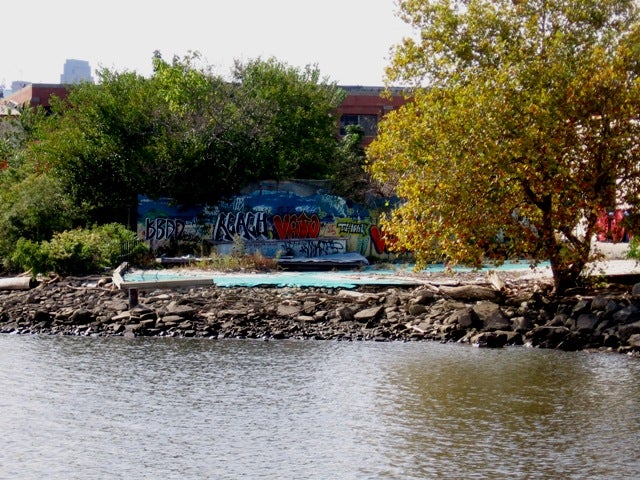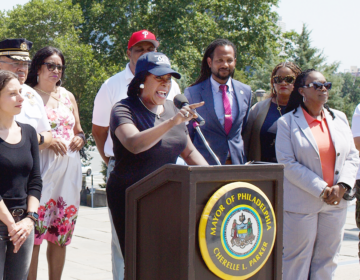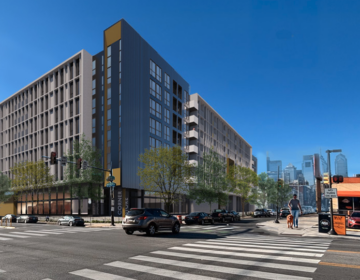Riparian bills move to House floor

June 29
By Kellie Patrick
For PlanPhilly
Penn Treaty Park could get a lot of new neighbors and a lot more foot traffic.
NCCB Associates, LP of Philadelphia hopes to build a 35-story condo tower just south of the park, at Pier 53 – a site that was formerly home to the Club Maui and Sammy’s BBQ.
The project would include public access to a riverfront trail on the property and public restrooms for those who use Penn Treaty Park.
“They are planning to help maintain Penn Treaty, which is one of those parks that doesn’t get the attention of Rittenhouse Square,” said Mary Isaacson, aide to Rep. Michael O’Brien, in whose district the proposed site sits.
The Fishtown Neighbors Association zoning committee met with the developer earlier this month.
The condos will mostly be 1 or 2 bedrooms, with some 3-bedroom units, said zoning committee chairman Matt Pappajohn. The price range is “very expensive – $500 to $600 per square foot wouldn’t surprise me,” he said.
The developer told those who came to the meeting that he anticipated many buyers will be seasonal residents.
“We asked that more uses be devised for the first floor,” Pappajohn said. The original plan called for a lobby, parking and a small community room. “People brought up things like restaurants, coffee shops, and other amenities which would serve the neighborhood as well as the residents.”
NCCB Associates Chief Operating Officer Steve Labov was amenable to the community’s suggestions, Pappajohn said.
The project has been designed by BLT Architects of Philadelphia, the same firm that designed the transformation of the former RCA Victor warehouse into The Victor, an apartment complex that is a keystone of Camden’s waterfront renaissance plans.
BLT also designed Symphony House in Philadelphia.
In addition to potentially providing relief for users of Penn Treaty Park, the project could establish guidelines for granting the right to build on state-owned, riverbed property – called riparian land.
To build as planned, NCCB, or its nominee, needs to reach a lease agreement with the state.
Until earlier this month, there was a hold on such leases under a moratorium called more than a year ago by Gov. Ed Rendell. With casinos in the works, there was suddenly a lot more interest in development along the Delaware – and many felt the state should get more than $1 for a 99-year lease, as was commonly the practice. The moratorium was implemented so staff from the department of General Services, the agency which administrates the leases, and other agencies could study the issue.
But in Pennsylvania, riparian leases have always been initiated by the legislative branch – traditionally, only a legislator whose district contains the property in question would submit a bill granting the riparian rights.
So Rendell’s moratorium ticked off O’Brien, who thought the governor was trying to control something out of his realm.
O’Brien submitted bills that would grant such rights to both NCCB and VTE Philadelphia – a company, owned by Donald Trump, that wants to build another residential tower on Pier 55 ½.
The bills had been referred to the House State Government Committee when the Department of General Services announced its recommendations and the moratorium was lifted. Friday, the House State Government Committee members passed both of O’Brien’s riparian rights bills, without opposition. The bills now move to the House floor for a vote.
The recommendations suggest that developers pay a one-time fee of $5 per square foot of land for a 99-year lease, and that each lease include public access to the waterfront. Developers can get a discount on the lease fee if they pay for improvements that benefit the public.
These recommendations mean little until they make their way into leases. The Department of General Services hopes that the new guidelines will be followed from now on as individual lease agreements are worked out, said spokesman Sean Pressmann. The first few agreements could establish a pattern, he said, and so people will be watching to see if a precedent is set.
House State Government Committee Executive Director Rodney Oliver said some committee members don’t think $5 is enough, but Isaacson said O’Brien is comfortable with that figure, since it is based on market research and what other states charge.
She said it will take actual negotiations with a developer to see how well the credits-for-good-deeds part works.
Not to mention how it will work if there is a developer who does not wish to meet some suggested conditions, or if a property doesn’t lend itself to broad recommendations.
While the bill O’Brien submitted for Trump’s VTE calls for public access to the property, Isaacson said that isn’t part of Trump’s plan.
“The Trump project doesn’t have enough room,” she said. “Rep. O’Brien has tried to negotiate something where (VTE) will instead give money to create additional access and green space” elsewhere.
“We’re kind of holding our breath and waiting for this bill to go through the legislature,” NCCB’s Labov said.
As for the two biggest proposed riverfront developments, the Department of General Services recommendations included an estimated lease fee – about $2 million for both Foxwoods and SugarHouse.
But as of today, no legislator had submitted legislation that would grant riparian rights to either casino.
WHYY is your source for fact-based, in-depth journalism and information. As a nonprofit organization, we rely on financial support from readers like you. Please give today.






